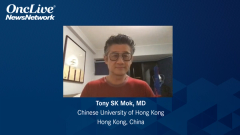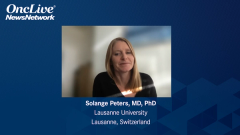
Molecular Testing in Early and Advanced NSCLC
Solange Peters, MD, PhD, and Tony SK Mok, MD, delve into the importance of molecular testing for EGFR mutant non-small cell lung cancer, including guidelines and commonly found barriers.
Episodes in this series

Solange Peters, MD, PhD: In looking at the EGFR [epidermal growth factor receptor] mutation testing, which was the first oncogene corresponding with this definition of oncogene addiction of driver. the testing algorithm is quite clear in the fact that it defines an EGFR mutation to be looked for in all patients with metastatic non-small cell lung cancer, which is not of squamous histological subtype. The squamous histological subtype has to be firmly defined to prevent the pathologist to look for EGFR mutation. All metastatic patients with non-squamous non-small cell lung cancer metastatic disease should be tested. This is usually done today by NGS [next-generation sequencing] in many countries, but still in Europe, only half to 60% of patients receive NGS testing. For the other patients, it can be targeted panels or even on EGFR that is analyzed. The main point of discussion today is to know how to implement testing beyond the metastatic setting. How or when should we implement EGFR testing when it is about the curated intent scenario and early disease. The data from the ADAURA trial, and provided that the institutions consent to consider osimertinib [Tagrisso] as an adjuvant treatment, can be analyzed. The main bottleneck is the reimbursement most of the time, thereafter the centers have to get organized to test for EGFR mutation in early disease. This is far from being implemented everywhere. In my institution, we have a reflex testing, which requires all patients coming with a non-squamous non-small cell lung cancer to be tested by NGS. This points out genes for all the drivers which may be recognized, as well as for PD-L1 [programmed death-ligand 1]. This is respective of the state of disease, and the pathologist is blinded to the stage when testing. I know this is not the case everywhere. There are places and countries where the reimbursement of testing is only covered by metastatic disease and there are real efforts to establish testing in early stage. Testing may be at the time of surgery to check all patients who might receive adjuvant osimertinib, would be tested for EGFR mutation. This is only if they are reimbursed and accessible. That’s really a new challenge.
Tony S.K. Mok, MD: Routine testing for all patients with adenocarcinoma is a norm in Southeast Asia. Everyone already knows that EGFR mutation is one of the most common mutations in our locality. On average, about 40% among the nonsmokers, thus almost all patients will get EGFR tested. Then, we routinely, many parts of Asia, will also do the ALK and ROS1 and PD-L1 [testing]. However, because NGS is not reimbursed, we do not routinely do NGS in all patients upfront.
As a routine in the past decade, the molecular testing is over for the patient with advanced disease simply because the therapeutic intervention was indicated for EGFR-, ALK-, or ROS1-positive in the first-line. However, over the previous year we don’t have much evidence in the early stage because there’s no adjuvant data until ADAURA, which was only in 2020. With the ADAURA data, the patient may have to receive adjuvant EGFR-TKI [tyrosine kinase inhibitor], namely osimertinib. Then, we start to test for EGFR in patients also at the early-stage disease. This year, in the United States, the FDA approved CO10. In other parts of the world, this is not approved but people know about the information, so PD-L1 is also gaining in popularity as being tested in the early-stage disease.
The 2 main barriers for EGFR testing is the tissue availability and the cost. First, let’s address the tissue availability. In Asia about 40% of lung cancer is still diagnosed by cytology. In the past, cytology samples may not be adequate for the standard PCR. Today, we have more sensitive testing methods that we can adopt and use parts of the DNA as a subsequent treatment to the tissue. Almost all patients will get tested for EGFR. That is 1 of the standards now at this stage. Then, regarding the cost, initially the EGFR testing was not reimbursed. Today, some governments including those in Thailand, Hong Kong, Taiwan, and Korea have begun to support the EGFR testing due to the importance of it. EGFR and ALK are commonly known today by many public health care systems.
Solange Peters, MD, PhD: From a technical and a rational point of view, testing for EGFR mutation should not be done alone as a single mutation. We know that in advanced non-small cell lung cancer, non-squamous non-small cell lung cancer, it’s not only EGFR you should look at. Analyzing between 12 to 20 mutations including KRAS, ALK, ROS1, RET, NTRK, MET, HER2 is important. Several mutations, which may have a BRAF, must be looked at as well. You’d like to test for a comprehensive, genomic kind of scenario that looks at all of these drivers using NGS. This method is the most efficient and cost-effective, specifically when analyzing metastatic non-small cell lung cancer. However, we know in Europe, from the European perspective, that NGS remains unavailable for almost half of the patients diagnosed with advanced non-small cell lung cancer. The pharma industry may face challenges as well when trying to create the geographical regional network to make sure the 50 genes are available to almost all through their disease journey in the future. In early disease stages, the only data you have is about EGFR. Is it more important to go for a single PCR for EGFR mutation testing and sequencing, or is it more important to go for the whole panel? The EGFR mutation testing and sequencing is important, and I would still advocate in lung cancer that getting an NGS at the start of sequencing is crucial. Whatever you choose to do with lung cancer, almost half of the patients will relapse. If you have this scenario in non-squamous non-small cell lung cancer, it is way more rational to test for the panel of genes with a comprehensive gene panel. However, the bottleneck is, of course, the reimbursement and the accessibility to NGS. It can only work with regional or national networks that are potentially supported by politicians and the governments. Eventually, NGS may be supported somehow by the pharma industry as well.
This transcript has been edited for clarity.




































